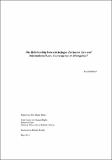| dc.contributor.advisor | Darcy, Shane | |
| dc.contributor.author | Rikhof, Joseph | |
| dc.date.accessioned | 2011-11-11T16:01:25Z | |
| dc.date.available | 2013-08-08T11:40:08Z | |
| dc.date.issued | 2011-05-30 | |
| dc.identifier.uri | http://hdl.handle.net/10379/2306 | |
| dc.description.abstract | While asylum as a concept has been known since ancient times, persons with a criminal background have always been treated with suspicion and depending on the time and place would either be granted asylum in a limited form or not at all. When amorphous notions related to asylum began to become crystallized in international treaties during the 20th century, the issue of criminality, although only pertaining to a very small number of asylum seekers, caused sufficient concern to the drafters of the various instruments to warrant its mentioning in a number of provisions in such agreements. Through the lens of exclusion from refugee status, this study assesses whether refugee law has remained in step with the international and domestic regulation of criminal conduct. At the international level, crimes such as genocide, crimes against humanity, war crimes, terrorism and organized crime have become the subject of international treaties and jurisprudence. These types of crimes, as well as other areas of concern have been increasingly incorporated into domestic criminal legislation. Since refugee law is used in the same countries, which have been in the forefront of regulating these new types of criminal behaviour, refugee decision makers have had to take into account these parallel developments. The purpose of this study is to determine how successful this attempt has been by comparing the legislation and jurisprudence in a number of countries and contrast those with the regulation of similar criminal conduct outside of refugee law. | en_US |
| dc.rights | Attribution-NonCommercial-NoDerivs 3.0 Ireland | |
| dc.rights.uri | https://creativecommons.org/licenses/by-nc-nd/3.0/ie/ | |
| dc.subject | International criminal law | en_US |
| dc.subject | Refugee law | en_US |
| dc.subject | Exclusion | en_US |
| dc.subject | Terrorism | en_US |
| dc.subject | Criminality in refugee law | en_US |
| dc.subject | Complicy in international law | en_US |
| dc.subject | Complicity in refugee law | en_US |
| dc.subject | Human Rights | en_US |
| dc.title | The Relationship between Refugee Exclusion Law and International Law: Convergence or Divergence? | en_US |
| dc.type | Thesis | en_US |
| dc.local.note | Governments do not like asylum seekers with a criminal background to come into or stay in their countries. Mechanisms have been developed to ensure that this does not happen both internationally and by individual countries. This thesis will look at these mechanisms to see how effective they are. | en_US |
| dc.local.final | Yes | en_US |
| nui.item.downloads | 3371 | |


